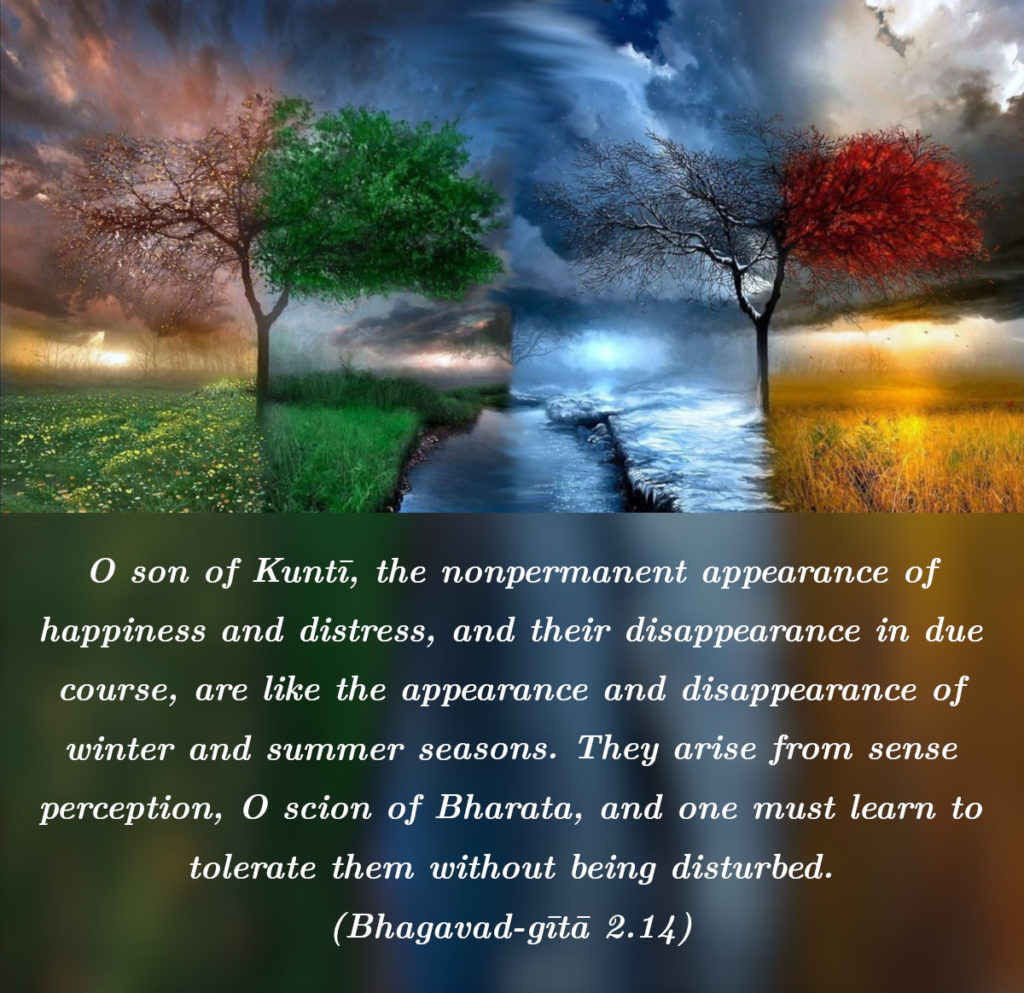मात्रास्पर्शास्तु कौन्तेय शीतोष्णसुखदु: खदा: |
आगमापायिनोऽनित्यास्तांस्तितिक्षस्व भारत || 14||
mātrā-sparśhās tu kaunteya śhītoṣhṇa-sukha-duḥkha-dāḥ
āgamāpāyino ’nityās tans-titikṣhasva bhārata
mātrā-sparśhāḥ—contact of the senses with the sense objects; tu—indeed; kaunteya—Arjun, the son of Kunti; śhīta—winter; uṣhṇa—summer; sukha—happiness; duḥkha—distress; dāḥ—give; āgama—come; apāyinaḥ—go; anityāḥ—non-permanent; tān—them; titikṣhasva—tolerate; bhārata—descendant of the Bharat
Translation:
Contact of the senses with the objects produces heat and cold, pain and pleasure. These experiences come and go, and are impermanent. Endure them, O Arjuna!
Commentary:
Those who do not know that the world is a great illusion consider that the experiences of the senses and the mind are real, and super-impose them on themselves and suffer all through their life. But those who know that these modifications belong to the realm of the body only and that the Self remains untroubled and uncontaminated by them, are free from pleasure and pain, and such men live always in a state of happiness. However, so long as man is in the embodied state, even the Jnani must go through the physical changes. But since he knows the sharp distinction between the body and Atma, his attitude to them is entirely different from that of the ignorant man. So the Lord’s command is ‘endure them’. (`Titikshasva’). There is no other way.
Producers of pleasure and pain: The pleasure experienced by the senses is not pure pleasure. It is mixed with pain. If it is a pure pleasure, it should not have any touch of pain either -before or afterward. Elsewhere in the Gita, it is said that the pleasures derived through contact of the senses with worldly objects are themselves the source of pain. The common experience is also the same. The same thing causes pain and pleasure under different circumstances, in varying degrees. There can be no such thing as pleasure apart from pain. They are the two sides of the same coin. They are called `dvandvas’ – pairs of opposites, which always go together. So the Lord speaks of them together as producers of pleasure and pain (sukhadukhadah).
With beginning and end: When worldly pleasures come no one need be elated, for their nature is not simply to appear but to disappear also, and where there is elation there should be depression. Pleasures come as guests and again depart. They are transitory and short-lived. Therefore one should not get himself attached to them. Such attachment will always lead to pain when they disappear, and it is absolutely certain that they disappear in course of time. He is then the ‘dhira’- the man of courage, who is disinterested in them and feels no attraction for them. The foolish man is deluded by the superficial attractions offered by sense objects, runs after them, and gets himself caught in the whirlpool of Samsara. And besides, even a casual observer knows that not desired by him, several painful things come to him by the power of providence in the cyclic motion of time, and he should be in a position to conclude that even pleasures would come similarly through time, and precious life need not be wasted for obtaining such pleasures. The duty of every thoughtful man is to seek Truth in the midst of this changing phenomena, and the unadulterated Ananda which is pure and perfect and which brings no pain in its wake. The Lord exhorts Arjuna to seek such permanent joy.
Endure: Endure them (Titikshasva). This is one of the great mantras of the Gita. Man should be equal-minded when cold and heat, pleasure and pain, come in the form of an endless chain. So long as man has the body, they come. No one can stop them. So the Lord gives the satvic law (titikshasva) – endure them. Like sama and dama – control of the internal and external organs, `titiksha’ – endurance is an absolutely necessary qualification for the spiritual seeker.
Sri Ramakrishna Says —
MASTER: “Ah, what a nice song! “Fountain-head of Bliss’! ‘Fruit of Truth’! ‘Laugh and dance and weep and sing’! Your song tastes very sweet to me. Why should you worry?
“Pleasure and pain are inevitable in the life of the world. One suffers now and then from a little worry and trouble. A man living in a room full of soot cannot avoid being a little stained.” (Source: Gospel of Sri Ramakrishna)
📑Note: Bhagavad Gita 2.14, 2.15 and 18.48, 18.49 are similar.
- O Arjuna! One should not abandon the duty to which he is born, though it is attended with evil; all undertakings are indeed enveloped by evil, like fire by smoke. (BG 18.48)
- He whose intellect is unattached, who has subdued his self, whose desires are quelled, by renunciation attains the supreme actionless state of Atma. (BG 18.49)
The bearing of all afflictions without caring to redress them, being free (at the same time) from anxiety or lament on their score, is called Titiksha or forbearance.
— Vivekachudamani, Verse 24
Question: What is the nature of sense experiences?
Answer: They produce heat and cold, pleasure and pain. They come and go. They are impermanent.
Question: What should one do when they come?
Answer: He should endure them with an equal mind and remain calm and unmoved.
Notes:
1. A festival was being held at the house of a senior devotee of Sri Chaitanya. During the celebration, the devotee received the news that his son had passed away, but he suppressed the fact from everyone so that the festival could continue without disturbance.
2. During a girl’s Narmada Parikrama, her mother passed away. However, her father asked her not to return home and to continue the pilgrimage, saying, “Tomorrow I will die, the day after you will die; death is inevitable. You have embarked on a noble pursuit—keep going.”
